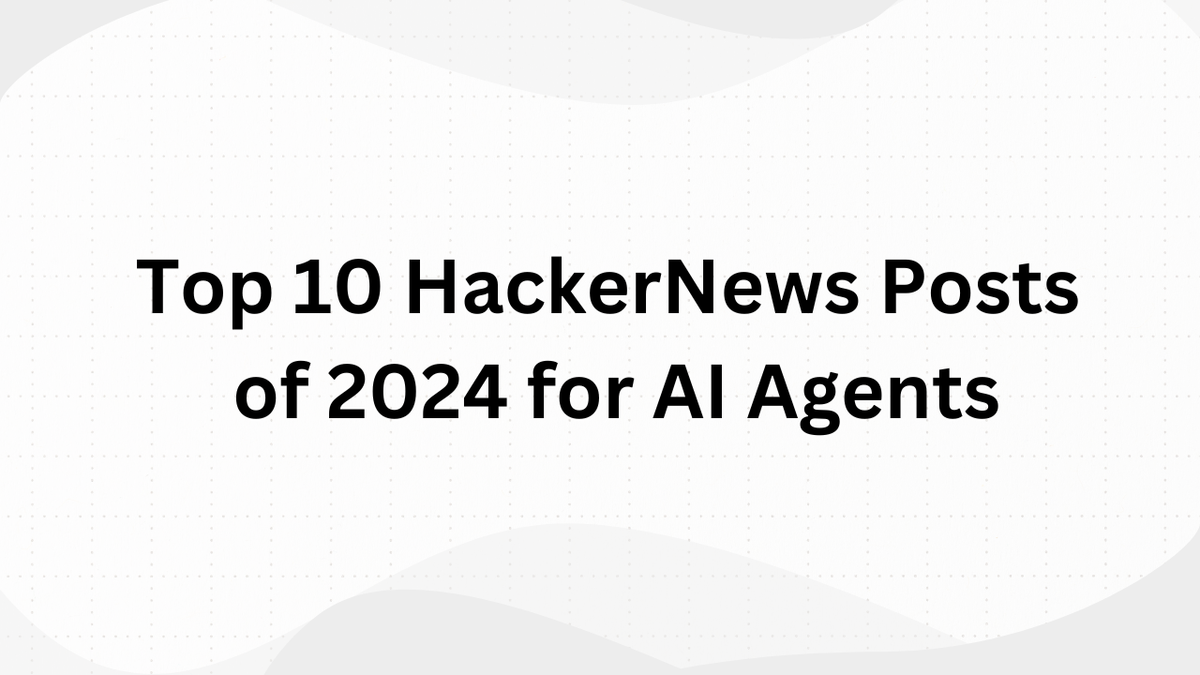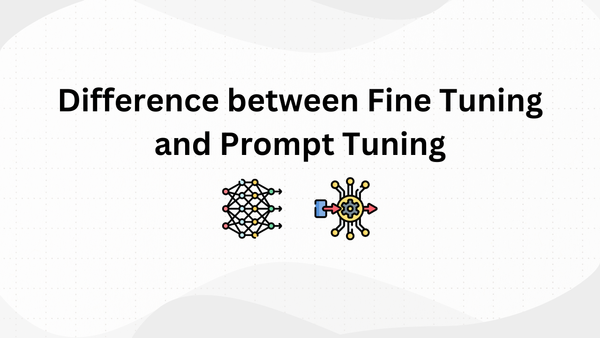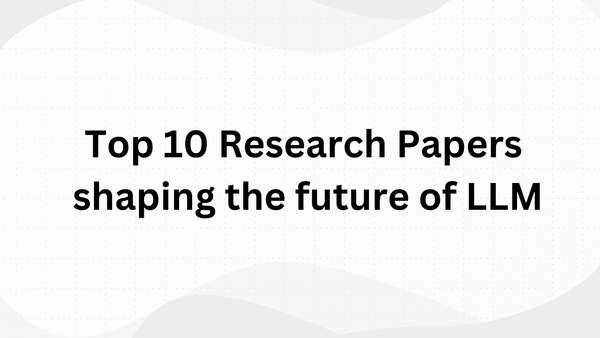Top 10 Hacker News Posts of 2024 for AI Agents

This year, AI agents levelled up—moving beyond simple tools to become intelligent systems that can reason, collaborate and tackle complex tasks. Unlike traditional AI models constrained by static parameters, these agents integrate decision-making and execution, operating in decentralised or multi-agent ecosystems to tackle real-world challenges across robotics, healthcare, and autonomous systems.
This post features the top 10 Hacker News discussions of 2024 that shaped the conversation around AI Agents and their impact. Let’s delve into the details.
1) A real time AI video agent with under 1 second of latency
Link: https://news.ycombinator.com/item?id=41710227
Upvotes: 455
Comments: 256
Summary of Conversation: Tavus, an AI company, introduced conversational video interfaces using digital twins, achieving under 1-second latency through significant optimizations like Gaussian Splatting and LLM improvements. The discussion praises the technology’s potential in education, sales, and eldercare but raises concerns about privacy, data security, and ethical misuse.
2) Agent.exe, a cross-platform app to let Claude 3.5 Sonnet control your machine
Link: https://news.ycombinator.com/item?id=41926770
Upvotes: 406
Comments: 232
Summary of Conversation: This HN thread discusses using Anthropic's Claude for desktop automation with Agent.exe, noting its quick setup but frequent errors in task execution, like booking incorrect dates. Users debated its cost-effectiveness (~$0.38 per task), security risks, and practicality compared to human labor. While some see promise in AI-driven automation, others criticized its unpredictability and raised concerns about granting such tools full control of computers.
3) LlamaGym – fine-tune LLM agents with online reinforcement learning
Link: https://news.ycombinator.com/item?id=39658610
Upvotes: 239
Comments: 28
Summary of Conversation: LlamaGym simplifies fine-tuning LLM agents with reinforcement learning by handling complexities like conversation context, reward assignment, and training setup in a single Agent class. A user proposed using such tools to create a Discord bot that impersonates friends and refines its responses over time. The discussion explored the challenges of adapting RL concepts, such as continuous learning, to LLMs and highlighted practical tools and computational hurdles in building dynamic conversational agents.
4) Tarsier – Vision utilities for web interaction agents
Link: https://news.ycombinator.com/item?id=40369319
Upvotes: 192
Comments: 61
Summary of Conversation: This thread introduces Tarsier, a tool enabling text-only LLMs to understand webpage structures by converting visual elements into whitespace-structured text via OCR. It tags interactable elements for LLM actions and maps intents back to browser elements. Outperforming multimodal GPT-4V/O by 10–20%, it excels in web data extraction but faces challenges with dynamic layouts and context handling.
5) Flow – A dynamic task engine for building AI agents
Link: https://news.ycombinator.com/item?id=42299098
Upvotes: 160
Comments: 50
Summary of Conversation: Flow is a lightweight task engine for building AI agents that prioritizes simplicity and flexibility based on queue system designed to overcome limitations of graph-based workflow engines like LangGraph. Flow eliminates the need to predefine node connections, enabling concurrent execution, runtime scheduling, and smart dependencies for state management.Built on Python's ThreadPoolExecutor, it is lightweight, thread-safe, and suited for dynamic AI workflows such as map-reduce and self-modifying tasks.
6) Nous – Open-Source Agent Framework with Autonomous, SWE Agents, WebUI
Link: https://news.ycombinator.com/item?id=41202064
Upvotes: 155
Comments: 37
Summary of Conversation: The thread introduces Nous, a TypeScript framework for building agents with features like database persistence, tracing, a Web UI, and human-in-the-loop functionality. Initially developed for automating DevOps workflows, it evolved into a tool supporting coding agents and autonomous agents with LLM-independent function execution in a WebAssembly sandbox. Community feedback praises its depth but highlights the need for clearer examples and a potential name change due to overlaps with Nous Research.
7) Steel.dev – An open-source browser API for AI agents and apps
Link: https://news.ycombinator.com/item?id=42245573
Upvotes: 114
Comments: 52
Summary of Conversation: This post talks about Steel, an open-source browser automation API designed to simplify building web-interacting AI agents by handling infrastructure challenges like session management, proxy rotation, and CAPTCHA solving. It uses isolated Chromium instances deployed on Firecracker VMs for speed and scalability, accessible via Puppeteer, Playwright, or Selenium.
8) Windsurf – Agentic IDE
Link: https://news.ycombinator.com/item?id=42127882
Upvotes: 101
Comments: 51
Summary of Conversation: This post introduces Windsurf, a VSCode fork by Codeium, integrates advanced AI tools like Cascade, an evolved sidebar chat feature designed for deep reasoning and seamless collaboration with a user’s codebase. It boasts features like a fast autocomplete model, native inline diff generation, and the ability to manage tasks across multiple files simultaneously. he product positions itself as a powerful alternative to Cursor and similar IDEs, aiming to redefine AI-driven development workflows.
9) Use functional tokens for AI agents to simplify app workflows
Link: https://news.ycombinator.com/item?id=40609907
Upvotes: 80
Comments: 10
Summary of Conversation: This thread introduces Octopus V2 by NEXA AI, a lightweight AI agent models optimized for faster, cheaper, and more accurate function-calling workflows compared to GPT-4o. These models aim to streamline human-computer interactions by simplifying complex, multi-step tasks into efficient processes. Designed for flexibility, they can power AI agents both on-device and in the cloud, making them suitable for mobile and web apps.
10) Codel – Autonomous Open Source AI Developer Agent
Link: https://news.ycombinator.com/item?id=39799296
Upvotes: 48
Comments: 15
Summary of Conversation: This project introduces Codel, a fully autonomous AI agent designed for handling complex tasks and projects by integrating terminal, browser, and editor functionalities. It autonomously performs next steps, fetches resources from the web, and manages file edits via a built-in text editor, while saving all command history in PostgreSQL. Designed for self-hosting, it features automatic Docker image selection and a modern, user-friendly interface.
Conclusion
In 2024, AI agents achieved significant technical milestones, notably in enhanced autonomy, multi-agent collaboration, and advanced reasoning capabilities. These developments have enabled AI agents to perform complex tasks with minimal human intervention, work seamlessly in teams, and exhibit improved problem-solving skills.
Looking ahead to 2025, we expect the field to move much faster and here are our predictions for the same:
- Specialized AI Models: The emergence of domain-specific AI agents tailored to particular industries or tasks, enhancing efficiency and effectiveness.
- Agentic AI Architectures: The evolution of AI systems capable of autonomous decision-making and actions, reducing reliance on human input.
- Human-AI Collaboration: Improved interfaces and interactions between humans and AI agents, fostering seamless collaboration and integration into daily workflows.
These advancements are set to further integrate AI agents into various sectors, enhancing productivity and transforming the technological landscape.
We are excited for 2025, are you?




